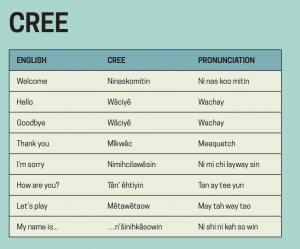This event was part of McGill’s Feminist Publishing and Tech Speaker Series in 2021, and more befitting to this course was co-hosted by the Initiative for Indigenous Futures (IFF). I came across Peter-Lucas Jones in an Unreserved with Falen Johnson CBC podcast (Johnson, 2021). In that podcast Jones speaks about his machine learning software he created to revitalize Māori language, culture, and traditional knowledge.
In this speaker series event, Jones, along with his partner Keoni Mahelona, bring up several interesting and important points about storing Indigenous languages and knowledge online. The first idea that Jones touches on is how Indigenous peoples have always stored data in song and dance (FP&TSS, 2021, 8:01). However, moving into the 21st century Indigenous groups are looking for ways to store their language and culture digitally. In doing so, Jones and Mahelona discuss ways to overcome the plight of using online platforms. To me, the most poignant notion is that although there are services offered for “free” by Facebook and YouTube, these companies are making money off the data that they collect from individuals and groups (FP&TSS, 2021, 29:33). In fact, Jones and Mahelona liken the data mining of big tech today to the land grabs of colonizers (FP&TSS, 2021, 56:27). An important way that they avoid giving into big data grabs is by creating their own platforms so that they own the data themselves (FP&TSS, 2021, 41:51). Another interesting point that is brought up is that of digital obsolescence (FP&TSS, 2021, 69:56). Digital obsolescence is prominent online. If Indigenous groups are using online platforms to keep their knowledge safe, they must ensure its continuity by keeping their links available online to circumvent online obscurity.
This is a long (92:14) video, but brings to light many important aspects of Indigenous online spaces.
References
Feminist Publishing and Tech Speaker Series (FP&TSS). (2021, March 3). Keoni Mahelona and Peter-Lucas Jones on Indigenous Data Sovereignty. [Video]. YouTube https://youtu.be/YgPfWUdtjig
Johnson, F. (Host). (2021, May 16). How Indigenous people are promoting and learning their languages. [Audio podcast episode]. In Unreserved with Falen Johnson. CBC. https://www.cbc.ca/listen/live-radio/1-105-unreserved/clip/15843149-how-indigenous-people-promoting-learning-languages.
